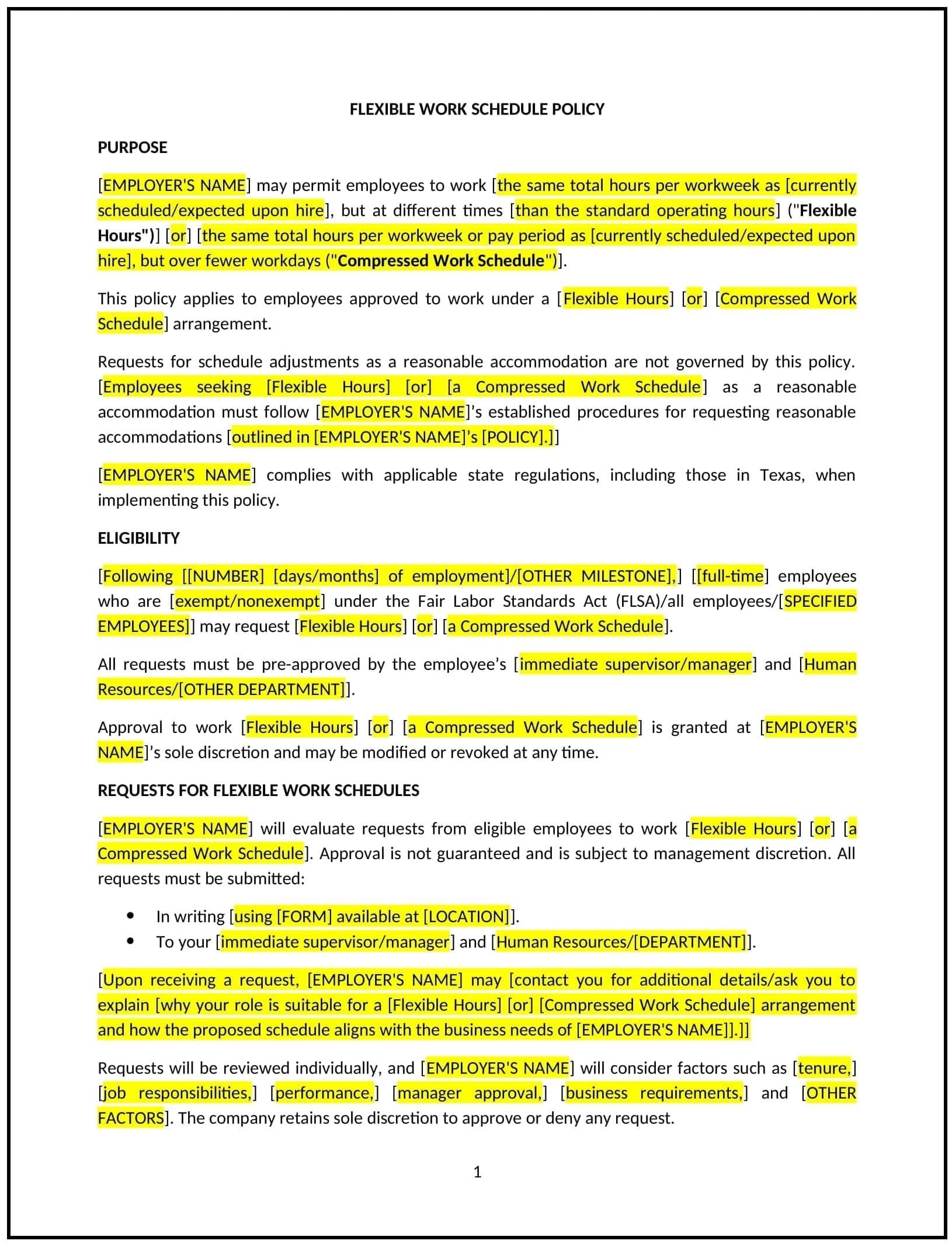Flexible work schedule policy (Texas): Free template
Got contracts to review? While you're here for policies, let Cobrief make contract review effortless—start your free review now.

Customize this template for free
Flexible work schedule policy (Texas)
This flexible work schedule policy is designed to help Texas businesses establish clear guidelines for offering flexible work schedules to employees. Whether businesses are implementing flexible hours, telecommuting, or compressed workweeks, this template provides a structured approach to providing flexibility while ensuring business needs are met.
By adopting this policy, businesses can improve work-life balance, increase employee satisfaction, and maintain productivity, all while complying with applicable Texas state laws and federal regulations.
How to use this flexible work schedule policy (Texas)
- Define flexible work options: Clearly explain the types of flexible work schedules available to employees, including options like flexible hours, remote work, compressed workweeks, or job sharing.
- Set eligibility requirements: Specify which employees are eligible for flexible work arrangements, including any criteria such as tenure, job position, or department.
- Outline approval process: Describe the process for requesting a flexible work schedule, including how employees should submit requests, the information needed, and the timeline for approval.
- Establish core hours or expectations: If applicable, set core hours during which employees are expected to be available, ensuring that flexibility does not disrupt business operations or team collaboration.
- Clarify performance and productivity expectations: Define how employees’ performance will be measured, ensuring that flexible work arrangements do not negatively impact productivity, quality of work, or team dynamics.
- Address communication and availability: Provide guidelines for maintaining communication and availability during flexible work hours, ensuring employees remain accessible and responsive to their team and clients.
Benefits of using this flexible work schedule policy (Texas)
This policy offers several benefits for Texas businesses:
- Improves employee work-life balance: Flexible work schedules help employees manage personal and family responsibilities, reducing stress and increasing job satisfaction.
- Increases employee retention: Offering flexible work options can improve retention by making the company more attractive to current and potential employees, particularly those with caregiving or lifestyle commitments.
- Boosts productivity: Many employees are more productive when they have control over their work hours and environment, leading to improved performance and job satisfaction.
- Reduces absenteeism: Flexible schedules allow employees to better manage their time, which can reduce absenteeism by accommodating personal needs and appointments.
- Supports business continuity: By offering flexible work options, businesses can ensure that operations continue smoothly, even during unforeseen circumstances, such as family emergencies or transportation disruptions.
Tips for using this flexible work schedule policy (Texas)
- Communicate the policy clearly: Ensure that all employees understand the flexible work schedule policy, including the types of arrangements available, eligibility, and the approval process.
- Maintain fairness: Ensure that flexible work arrangements are offered equitably and consistently, taking into account job duties, department needs, and business goals.
- Set clear expectations: Clearly define the expectations for performance, availability, and communication during flexible work hours to ensure that employees continue to meet their responsibilities.
- Monitor and evaluate: Regularly evaluate the effectiveness of flexible work schedules by tracking employee performance, productivity, and satisfaction to ensure that business needs are being met.
- Review regularly: Update the policy periodically to reflect changes in Texas state laws, business practices, or employee feedback related to flexible work options.